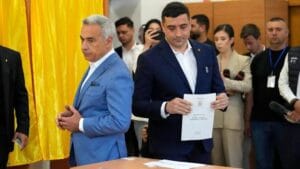China seeks to Build Bridges as Trump era dawns
Chinese state media has launched a global campaign to highlight cooperation and foster goodwill with the United States as Donald Trump’s new administration prepares to take office.

Chinese state media has launched a global campaign to highlight cooperation and foster goodwill with the United States as Donald Trump’s new administration prepares to take office. The initiative aims to bridge cultural differences and rebuild trust amid turbulent relations between the two superpowers.
The People’s Daily and Global Times, known for their frequent critiques of U.S. policies, announced on December 25 a call for global contributions of written work, photos, and videos. The objective, they said, is to promote mutual understanding and collaboration with the U.S. “What they are doing now is part of the latest efforts by the Chinese government to foster a more collaborative relationship with the Trump administration,” explained Li Wei-Ping, a researcher at the University of Maryland’s Philip Merrill College of Journalism, during an interview with Radio Free Asia.
China’s outreach comes as President-elect Trump signals plans for a more confrontational stance on trade, including imposing significant tariffs on Chinese goods. Experts predict his second term could bring a profound reshaping of U.S.-China economic ties. However, Beijing appears to be steering the relationship in a more positive direction. Foreign Minister Wang Yi, in a December 27 commentary for the state-run Study Times, urged Washington to “make the right choices” by working with China for “stable, healthy, and sustainable development in Sino-U.S. relations.”
State media outlets have echoed similar sentiments. Xinhua News Agency praised people-to-people exchanges, such as tourism, as key to strengthening bilateral ties. “The talk, the articles, and the campaign … could be deemed as a whole as an indication that the Chinese government is preparing for the Trump administration 2.0,” Li noted.
Meanwhile, Trump has offered mixed signals. While extending an invitation to Chinese President Xi Jinping to attend his January inauguration, he has also filled top roles in his administration with outspoken critics of Beijing. Appointees include Marco Rubio as Secretary of State, Rep. Mike Waltz as National Security Adviser, and Rep. Elise Stefanik as U.S. Ambassador to the United Nations. On December 9, Trump further selected three trade hawks for key State Department positions, including Michael Anton, who has publicly questioned U.S. support for Taiwan against Chinese aggression.
The delicate Taiwan issue remains a flashpoint. Earlier this month, Beijing reiterated its “one-China” principle, warning the U.S. against undermining its sovereignty over Taiwan. Li, however, cautioned against premature optimism about the apparent thaw in relations. “I am hesitant to say the narrative has totally shifted and believe we need more time to see if this current amicability will last,” she said.
As both nations navigate these early interactions, the world watches to see if cultural diplomacy can soften the edges of a historically fraught relationship.










